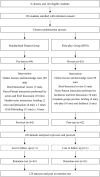Effect of two teaching methods on nursing students' acquisition of patient-centered communication competence in older people care: a cluster randomized trial
- PMID: 39764191
- PMCID: PMC11701056
- DOI: 10.3389/fpubh.2024.1510620
Effect of two teaching methods on nursing students' acquisition of patient-centered communication competence in older people care: a cluster randomized trial
Abstract
Introduction: Patient-centered communication is an essential skill in nursing, particularly in the care of older adult patients. However, generation Z nursing students, who primarily communicate through digital platforms, face unique challenges in adapting to traditional face-to-face communication with older adults. As a result, there is a need for teaching methods that align with this generation's learning style to enhance their communication skills. This study aimed to compare the effectiveness of two teaching methods-standardized patient simulation and role-play-on nursing students' acquisition of patient-centered communication competence in older people care.
Methods: A controlled cluster-randomized trial was conducted with 124 nursing students, divided into eight teaching groups. Students participated in either a standardized patient simulation or a role-play workshop, each consisting of a 1.5-h online module and a 1.5-h face-to-face session. The three components of patient-centered communication competence-knowledge, skills, and self-efficacy-were assessed using simulated scenarios at pre-test, post-test, and 6-week follow-up. Between-group and within-group differences were measured based on the number of students who achieved competence.
Results: Both interventions significantly improved students' knowledge, skills, and self-efficacy in patient-centered communication between pre- and post-tests, with improvements maintained at follow-up. No significant differences were found between the two methods.
Conclusions: Both standardized patient simulation and role-play are effective in enhancing patient-centered communication competence in older people care. However, neither method was found to be superior in teaching knowledge, skills, or self-efficacy.
Keywords: generation Z; nursing; older people; patient-centered communication; role-play; simulation; standardized patient.
Copyright © 2024 Cortés-Rodríguez, López-Rodríguez, Roman, Granero-Molina, Fernández-Sola and Hernández-Padilla.
Conflict of interest statement
The authors declare that the research was conducted in the absence of any commercial or financial relationships that could be construed as a potential conflict of interest.
References
-
- Banco Mundial. Población de 65 años de edad y más (% del total) (2022). Available at: https://datos.bancomundial.org/indicator/SPPOP65UPTOZS?end=2019&start=1960 (accessed March 18, 2023).
Publication types
MeSH terms
LinkOut - more resources
Full Text Sources
Research Materials


